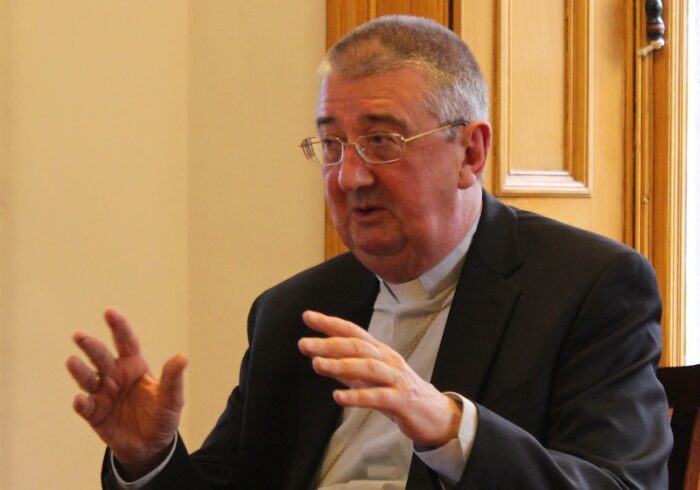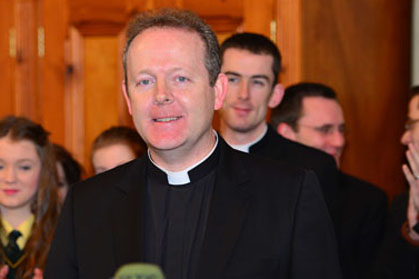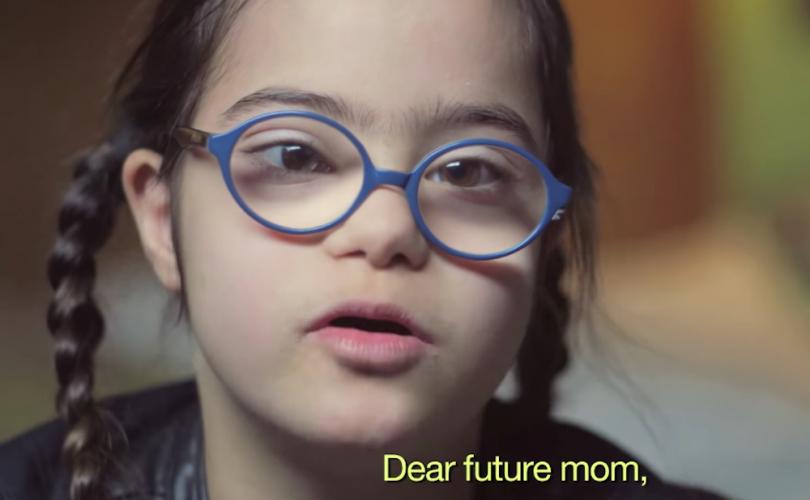


The head of the Irish Bishops’ Conference has reacted with dismay to the decision of the Northern Executive to close churches across Northern Ireland for two weeks from November 27th.
Archbishop of Armagh, Eamon Martin called the news “unexpected” and described it as “a great disappointment”.
He added that it was “contrary to the assurances given to faith groups at a meeting just last week at which we were praised for our attention to safety and public health.”
He said the Church would urgently request that the ban on public worship would be for the shortest period possible.
He will also seek urgent clarification on whether churches may open for individual visits and private prayer.
“I cannot understand how a person may still go to an off-licence to buy alcohol but might not be permitted to visit and sit in quiet solitary prayer in a large church. The right to do this is particularly important for Catholics,” he said.
“In speaking about ‘saving Christmas’, I urge the Executive to accept that for many people a ‘meaningful Christmas’ is about more than shopping, eating and drinking. Spiritual preparation is essential”.

A hospital consultant made a protected disclosure to the Minister for Health in 2018 raising concerns about clinical genetic services at the National Maternity Hospital (NMH).
The disclosure was made shortly before a couple agreed to an abortion after their unborn child was mistakenly diagnosed with a genetic condition trisomy 18, or Edwards’ syndrome.
The couple claim they were told there was no hope for the baby after the first test and were not given the opportunity to discuss their case with a consultant clinical geneticist, who might have advised them to wait for the results of a second test.
The abortion took place in March 2019, before a more comprehensive test showed the baby was healthy.
The whistleblowing consultant raised concerns about the provision of clinical genetic services at the NMH in November 2018, after being informed of a proposal to outsource all genetic and laboratory services to Birmingham Women’s Hospital.
Meanwhile, the couple have personally written to Taoiseach Micheál Martin outlining their distress that a review of the case is still unable to get under way.
They said they do not have full trust and confidence in the process and they feared they were being “kept in the dark” regarding critical, ongoing communications between the Department of Health and the hospital.

The Bishop of Raphoe is calling on the government to lift the ban on public worship, put in place as a measure against Covid-19.
The ban has been part of mid-level restrictions imposed since early October.
Rev Alan McGuckian, SJ, said the prospect of churches remaining closed in the weeks leading up to Christmas was “both frustrating and frightening”.
Speaking to the Donegal News, he said he would encourage parishioners to lobby their TDs to put pressure on the Cabinet and public health authorities to have public Masses reinstated.
“We are 100 per cent supportive, and always have been, of everything the Government is trying to do but our Churches have shown themselves to be such safe spaces. Many people who are suffering more this time than before are saying that they really need to get back to their worship of God.
“I’m really supportive of people speaking to their public representatives and encouraging them to get the Government to see that it makes perfect sense that the churches, in absolute safety, should be opened for worship,” Bishop McGuckian said.

Emmerdale producers have defended a forthcoming storyline which will see a couple terminate their pregnancy after being told their unborn child has Down’s syndrome.
The move comes despite a backlash from some, who said the ITV soap was perpetuating the idea that those with Down’s syndrome do not lead lives worth living.
Tim Reid, the co-creator and co-writer of Car Share, tweeted: “Dear Emmerdale, are you confident you’ve tackled this story in a way your audience with Down’s syndrome deserve? Have you taken the same approach you would if characters were choosing to end a pregnancy for reason of gender, race or physical disability?”
Wendy O’Carroll, the founder of support charity Ups and Downs Southwest, voiced her concerns in an open letter to Emmerdale which was widely shared on Facebook.
“Your proposed story will further serve to encourage and confirm the opinion that ending the life of a baby just because it has Down syndrome is perfectly acceptable and understandable because maybe it would be better if fewer people ‘like them’ were in the world,” she said.

The Organization for Security and Cooperation in Europe published data Monday documenting more than 500 hate crimes against Christians in Europe in 2019.
Incidents included attacks against Catholic priests, arson attacks on Catholic churches, the destruction of images of the Virgin Mary, vandalism of a pregnancy counseling center, and the theft of consecrated Eucharistic hosts from tabernacles.
France had the most hate crimes against Christians, with 144 incidents in 2019, the majority occurring against Catholic churches. The OSCE also reported 81 incidents in Germany, 75 in Spain, and 70 in Italy.
In total, there were 595 incidents against Christians documented by OSCE. Of these, 459 were attacks against property and 80 were violent attacks against people. Nearly a fourth of the data on Christians was reported directly by the Holy See.


